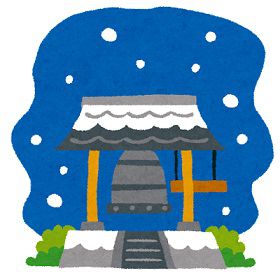Blogs edited and submitted by Chiho Kamioka
JOI Support staff and manager.
The last day of the year in Japan
Celebrate New Year Japanese style
Japan's New Year ceremonies have roots in ancient history and have a deep meaning for removing bad feelings from your heart. Scroll down to read more. Use this free Japanese lesson blog to learn new vocabulary and Kanji.
大晦日
New Year's Eve

By YAMAMOTO Hiroshi

今日は1年最後の日12月31日の大晦日を紹介します。
昔の日本では、月の最後の日を晦日と呼んでいました。その呼び方が今でも残り、一年の最後の日にあたる12月31日を大晦日といいます。
大晦日には多くの日本人はそばを食べます。「年越しそば」と言います。 「そば」は細く長いので「長生き」のイメージがあるため、来年も健康であるようにと、年越しに食べられるようになりました。
また、大晦日に行われるイベントに「除夜の鐘」があります。 これは12月31日の夜から1月1日にかけて、お寺の鐘を鳴らすものです。 大晦日の夜を「除夜」と呼ぶことから、除夜の鐘といいます。
人の心の中にはだれでも欲望、怒り、執着など108個の良くない気持ちがあると言われています。 その良くない気持ち108個を取り除き、新年を迎えるため、除夜の鐘は108回鳴らします。 私の住んでいる所でもお寺があり、大晦日の夜には除夜の鐘が聞こえます。
この1年間「日本の行事と生活」をテーマにして、ブログを書いてきましたが、今回で終了です。読んでいただきましてありがとうございました。またお会いいたしましょう。
良いお年をお迎えくださいませ。
To listen to this blog, please watch our Youtube video.
大晦日(おおみそか)
今日(きょう)は1年(いちねん)最後(さいご)の日(ひ)12月31日(じゅうにがつさんじゅういちにち)の大晦日(おおみそか)を紹介(しょうかい)します。
昔(むかし)の日本(にほん)では、月(つき)の最後(さいご)の日(ひ)を晦日(みそか)と呼(よ)んでいました。その呼び方(よびかた)が今でも残(のこ)り、一年(いちねん)の最後(さいご)の日(ひ)にあたる12月31日(じゅうにがつさんじゅういちにち)を大晦日(おおみそか)といいます。
大晦日(おおみそか)には多(おお)くの日本人(にほんじん)はそばを食(た)べます。「年越(としこ)しそば」と言(い)います。 「そば」は細(ほそ)く長(なが)いので「長生(ちょうじょう)き」のイメージがあるため、来年(らいねん)も健康(けんこう)であるようにと、年越(としこ)しに食(た)べられるようになりました。
また、大晦日(おおみそか)に行(おこな)われるイベントに「除夜(じょや)の鐘(かね)」があります。 これは12月31日(じゅうにがつさんじゅういちにち)の夜(よる)から1月1日(いちがつついたち)にかけて、お寺(てら)の鐘(かね)を鳴(な)らすものです。 大晦日(おおみそか)の夜(よる)を「除夜(じょや)」と呼(よ)ぶことから、除夜(じょや)の鐘(かね)といいます。
人(ひと)の心(こころ)の中(なか)にはだれでも欲望(よくぼう)、怒り(いかり)、執着(しゅうちゃく)など108個(ひゃくはち)の良(よ)くない気持(きも)ちがあると言(い)われています。 その良(よ)くない気持(きも)ち108個(ひゃくはちこ)を取(と)り除(のぞ)き、新年(しんねん)を迎(むか)えるため、除夜(じょや)の鐘(かね)は108回(ひゃくはちかい)鳴(な)らします。 私(わたし)の住(す)んでいる所(ところ)でもお寺(てら)があり、大晦日(おおみそか)の夜(よる)には除夜(じょや)の鐘(かね)が聞(き)こえます。
この1年間(いちねんかん)「日本(にほん)の行事(ぎょうじ)と生活(せいかつ)」をテーマにして、ブログを書(か)いてきましたが、今回(こんかい)で終了(しゅうりょう)です。読(よ)んでいただきましてありがとうございました。またお会(あ)いいたしましょう。
良(よ)いお年(とし)をお迎(むか)えくださいませ。
New Year's Eve
Today we introduce New Year's Eve, the last day of the year, 31 December.
In ancient Japan, the last day of the month was called 'Misoka'. That name still remains and 31 December, the last day of the year, is called 'Misoka'.
Many Japanese people eat soba on New Year's Eve. It is called "Toshikoshi soba". Soba is thin and long, giving it the representation of 'long life', so it is eaten on New Year's Eve to wish people good health in the coming year.
Another event that takes place on New Year's Eve is the 'Joya no Kane' (bell tolling ceremony). This involves the ringing of temple bells from the night of 31 December to 1 January. The night of New Year's Eve is called 'Joya' , hence the name 'Joya no Kane'.
It is said that everyone has 108 bad feelings in their hearts, such as desire, anger and attachment. In order to remove these 108 bad feelings and welcome the New Year, the temple bell is rung 108 times. There is a temple where I live, and on New Year's Eve you can hear the temple bell ring 108 times.
I have been writing a blog on the theme of 'Japanese events and life' for the past year, but this is the last one. Thank you very much for reading. See you again next year.
Please have a happy New Year.
大晦日(おおみそか)New Year's Eve
執着(しゅうちゃく)attachment

I started teaching Japanese to technical intern trainees and internship students, and since 2019, online Japanese instructor at JOI.
My main focus is on Business Japanese and JLPT grammar (N1,N2.N3) in particular. I am also available for short-term private lessons to improve your business Japanese skills before joining a company, taking an assignment, or changing jobs on your requested schedule.
I worked for a major machine manufacturer for about 40 years. During that time, I was assigned to various departments such as factories, trading, R&D, sales, general affairs, accounting, and auditing. With these experiences, I believe I can provide you with practical assistance in various situations when you are doing business in Japanese.

